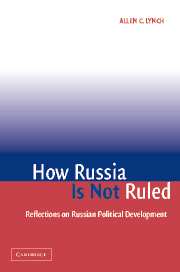Book contents
- Frontmatter
- Contents
- Acknowledgments
- Introduction
- 1 Historical Patterns of Russian Political Development
- 2 Soviet Legacies for Post-Soviet Russia
- 3 The 1990‘s in Russia: A New Time of Troubles?
- 4 Russia's “Neopatrimonial” Political System, 1992–2004
- 5 The Russian 1990s in Comparative Perspective
- 6 What Future for Russia? Liberal Economics and Illiberal Geography
- Conclusions
- Select Bibliography
- Index
1 - Historical Patterns of Russian Political Development
Published online by Cambridge University Press: 14 January 2010
- Frontmatter
- Contents
- Acknowledgments
- Introduction
- 1 Historical Patterns of Russian Political Development
- 2 Soviet Legacies for Post-Soviet Russia
- 3 The 1990‘s in Russia: A New Time of Troubles?
- 4 Russia's “Neopatrimonial” Political System, 1992–2004
- 5 The Russian 1990s in Comparative Perspective
- 6 What Future for Russia? Liberal Economics and Illiberal Geography
- Conclusions
- Select Bibliography
- Index
Summary
View of an American political scientist: “ … the sheer size of the government varied directly with the effort devoted to extraction, state making, protection, and, especially, war making but inversely with the commercialization of the economy and the extent of the resource base.”
– Charles TillyView of a Russian historian: “Autocracy and serfdom were the price the Russian people had to pay for national survival.”
– George VernadskyThe Argument
The purpose of this chapter is to investigate whether the apparent and distinctive tradition of Russian autocracy, under its Tsarist or Soviet guise, is an entirely random phenomenon and, to the extent that it is not, to identify its permissive conditions. We do so admittedly with an eye on the present: How much have the historical and environmental circumstances that have sustained Russian autocracy changed? How susceptible to political intervention are these circumstances? Finally, how might these circumstances be changed or ameliorated by political action by Russians and their foreign partners?
The argument advanced in this chapter may be summarized as follows: Russian political development has been shaped by the same set of factors that influenced the contours of European political development and the evolution of the various European states in particular. Whatever the degree of Asiatic (that is, Mongol) influences on Russian political culture – and they were significant – as Russia emerged from the northern Russian forest zone under the leadership of Muscovy, Russian rulers found themselves increasingly constrained to participate in an international political system dominated by more powerful and technically more advanced European states.
- Type
- Chapter
- Information
- How Russia Is Not RuledReflections on Russian Political Development, pp. 18 - 46Publisher: Cambridge University PressPrint publication year: 2005



